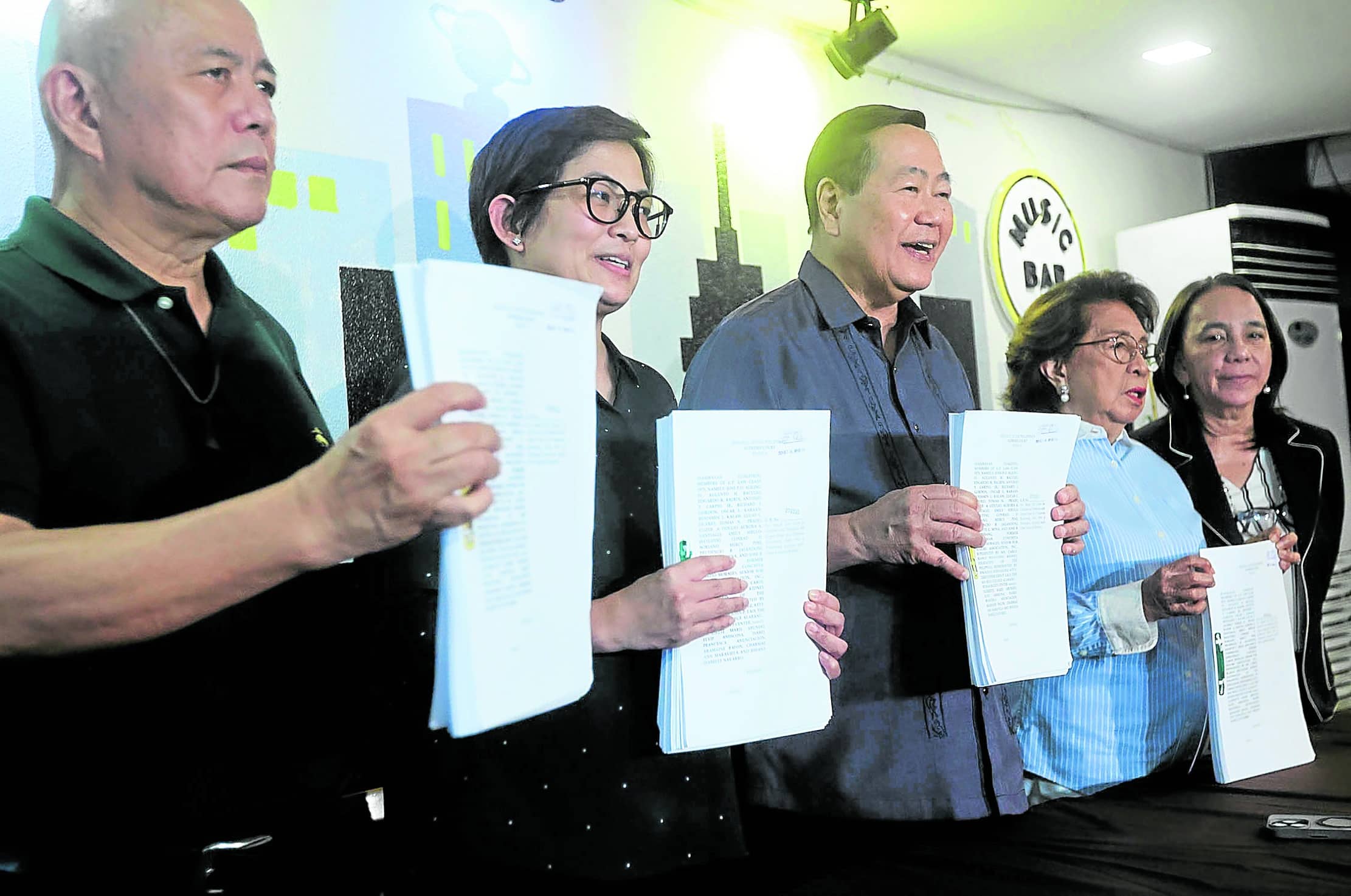3rd petition sees ‘plunder’ in PhilHealth fund transfer

P90-B QUESTION The 1Sambayan Coalition headed by former Justice Antonio Carpio, with Fr. Robert Reyes, former Finance Undersecretary Cielo Magno, former Ombudsman Conchita Carpio Morales and former Commission on Audit Commissioner Heidi Mendoza, joins the battle over the PhilHealth fund transfer to the treasury. —Marianne Bermudez
MANILA, Philippines — Finance Secretary Ralph Recto has committed “technical malversation and/or plunder” for ordering the transfer of P89.9 billion in excess funds of the Philippine Health Insurance Corp. (PhilHealth) to government coffers, according to a third case filed at the Supreme Court on Wednesday to question the controversial move.
The 45-page petition for certiorari and prohibition, filed by 1Sambayan Coalition and members of the University of the Philippines Law Class of 1975 led by retired Senior Associate Justice Antonio Carpio, urged the high tribunal to declare Recto’s order unconstitutional, along with the provision in the 2024 General Appropriations Act (GAA) that authorized the transfer.
The petitioners also included former Ombudsman Conchita Carpio Morales, former Sen. Richard Gordon, priests Flavie Villanueva and Robert Reyes, and students of San Beda College Alabang-Human Rights Center, among others.
READ: ‘Raid’ of PhilHealth funds can still stop, Recto told
In addition to Recto, named respondents in the case were Speaker Martin Romualdez, Senate President Francis Escudero, Executive Secretary Lucas Bersamin, and PhilHealth president and CEO Emmanuel Ledesma Jr.
Article continues after this advertisementTechnical malversation
“The transfer of special PhilHealth funds to the national treasury constitutes technical malversation because respondents applied public funds to another use other than that for which PhilHealth funds were appropriated,” the petitioners argued.
Article continues after this advertisementAll the requisites of technical malversation are present in the case at the bar, they noted, specifically pointing to Recto as the accountable officer who, because of his office, is accountable for the funds.
Based on a 2006 Supreme Court ruling on G.R. No. 156427, technical malversation happens when a public officer who has custody or control of public funds applies those funds or property to a public use different from that for which they were originally appropriated by law.
“[Recto] has diverted PhilHealth funds to some public use other than that intended by law. There shall be no reallocation of PhilHealth funds unless abandoned or their purpose has been accomplished,” the petition read in part.
“As discussed, there is no abandonment nor fulfillment of its purpose; thus, it must stay and finance the purpose for which it was originally collected from the people,” it added.
Constitutional violations
Plunder was also present, they said, when the respondents, being public officers, “amassed, accumulated or acquired ill-gotten wealth through a combination or series of misappropriation, conversion, misuse, or malversation of public funds or raids on the public treasury.”
Speaking to reporters after the filing, Carpio explained that the petition was based on two constitutional violations: the prohibition against passing any law that allows the transfer of appropriations and the provision that special funds collected through taxation for a specific purpose cannot be used for any other purpose.
“Under the Constitution, special funds can only be used for other purposes in two cases: if there is a law abandoning the original purpose, or if the purpose has already been accomplished,” Carpio explained.
He pointed out that PhilHealth funds were raised through a special law, specifically the excise tax from the sin tax law, which states that a certain percentage of excise taxes shall be allocated to fund PhilHealth’s objectives.
Since these are special funds raised for a specific purpose, the Constitution prohibits their use for any other purpose, he said.
In response to the allegations, Recto said: “We only followed instructions by Congress in the GAA 2024. Will respect [the] Supreme Court decision.”
TRO request
The high tribunal has scheduled the oral arguments on Jan. 14, 2025, on two consolidated cases—G.R. No. 275405 filed by Bayan Muna chair Neri Colmenares and G.R. No. 274778 by Sen. Aquilino Pimentel III—also questioning the legality of the PhilHealth fund transfer.
Similar to the two earlier petitions, 1Sambayan raised constitutional issues posed by the enforcement of Section 1 (d) of XLIII of the GAA 2024 and the Department of Finance’s Circular 003-2024 (DOF Circular 003-2024).
A temporary restraining order (TRO) is needed due to the “irreparable damage” that may be caused, Carpio said, “because once those funds are spent, no one in the government can reimburse or replace them.”
Shortly after the filing by 1Sambayan, Colmenares’ group, which had submitted an earlier petition, filed a supplemental motion also requesting a TRO.
In its motion, Bayan Muna urged the high court to immediately issue a TRO to prevent the respondents from transferring the remaining balance of PhilHealth funds scheduled for remittance to the unprogrammed appropriations.
The Bureau of the Treasury was set to receive the third tranche of P30 billion from PhilHealth on Wednesday, while the remaining P30 billion is scheduled for November.
Increasing risk
Although the Supreme Court set the oral arguments for early next year, the full P89.9 billion will likely have been remitted by then, raising concerns about the case becoming moot.
Former Commission on Audit Commissioner Heidi Mendoza, who joined Wednesday’s press briefing, said that once the Supreme Court’s decision is out, it could ultimately stop “dangerous budget practices.”
Noting how unprogrammed funds had become common in the budget process, Mendoza warned that they could be subject to less control compared to regular appropriations and that they may not be used for their intended purpose.
“We hope that if a TRO is issued, it will serve as an important reminder to government officials and budget planners to stop engaging in risky and dangerous budget practices,” she said.
The Department of Health earlier explained that a portion of the excess PhilHealth funds was used to finance the Health Emergency Allowance for health workers during the pandemic.